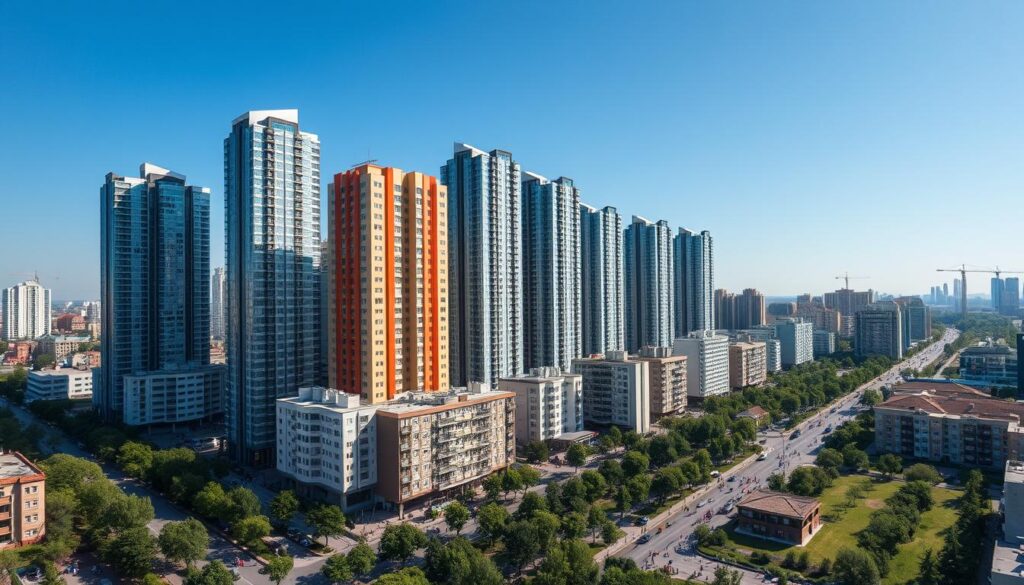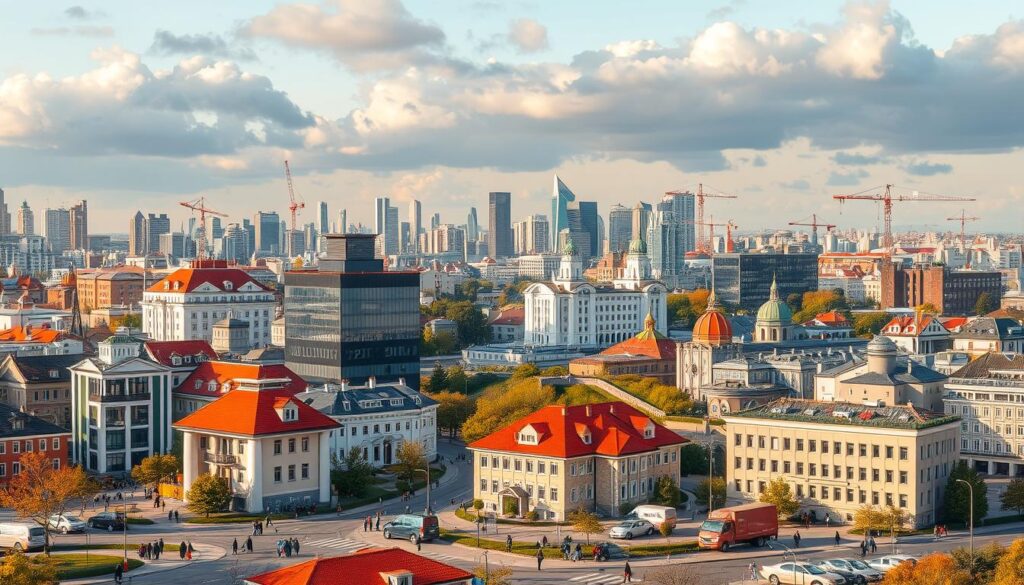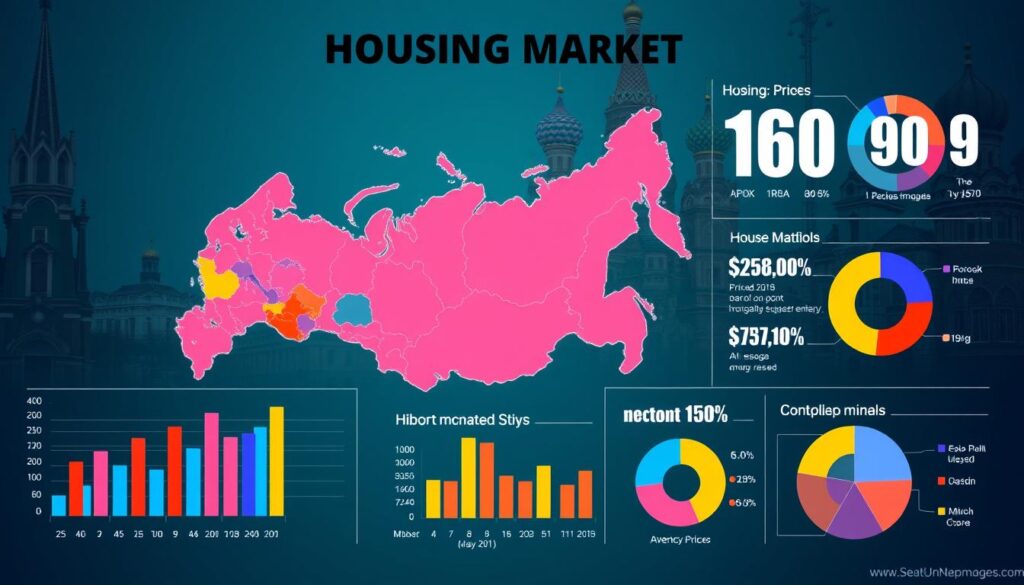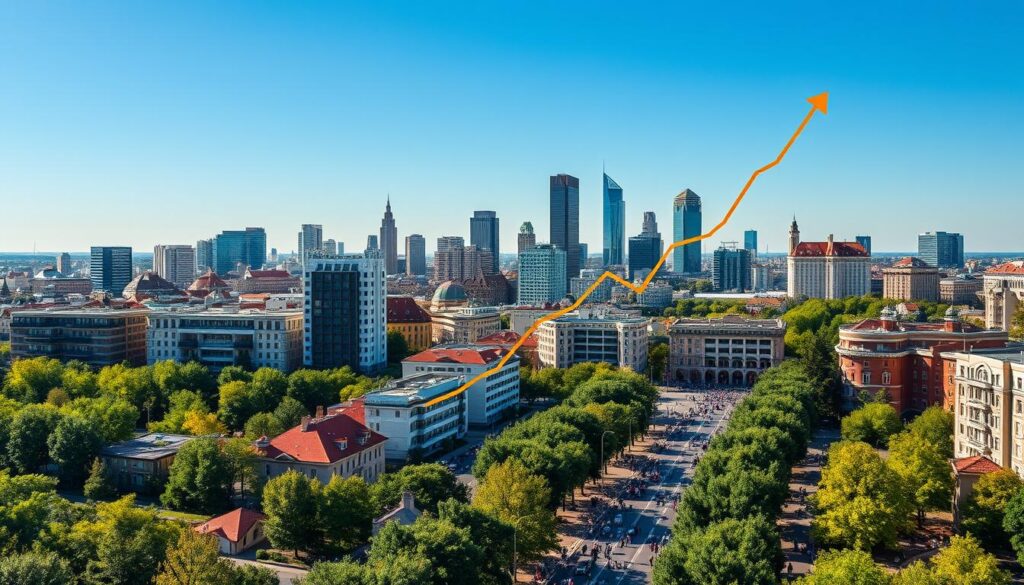The Russia housing market is seeing big changes, especially in average house prices per square meter. Recent findings show that the residential property market in Russia is up and down. This reflects the broader economic issues the country faces. Big cities like Moscow and St. Petersburg show these changes clearly. Property price trends are shaped by things like mortgage rates and the demand for housing.
As of early April 2025, the average cost per square meter in St. Petersburg fell by nearly 9%. This shows a wider trend that makes buyers more cautious in a shifting economic scene1.
Yet, homes in top locations or well-kept buildings are keeping their value. This shows how the market is split into different segments. It’s crucial for anyone looking to invest or understand real estate in Russia to know about these trends. As prices change, staying updated on the latest trends is key for buyers and sellers.
Key Takeaways
- The average residential property price is influenced by mortgage rates and economic factors.
- St. Petersburg experienced a 9% drop in property prices per square meter as of April 20251.
- Prestigious properties have maintained their value despite overall market declines.
- Understanding market trends is essential for making informed decisions in real estate.
- Residential markets in major cities are subject to fluctuation based on broader economic conditions.
Contact us if you are Interested in Buying Property Abroad!
Current State of the Russia Housing Market

The Russia housing market is moving fast. It’s shaped by economic factors and government actions. People are now choosing new houses over old ones because of good mortgage deals. They want homes in cities more than ever. After COVID-19, more folks own homes, about 12% more2.
Overview of Recent Developments
Recently, the housing index went up slightly, from 108 to 108.94, showing strength3. In Moscow, an apartment in the city center costs about 308,500 Roubles per square meter. This shows big price differences across Russia4.
Key Statistics from 2023
Last year, Russia’s housing market grew by 11.8% in December, doing better than before3. From March 2006 to December 2022, house prices went up by 5.1% on average3. The government is trying to help, but high rents and mortgage issues are making it hard for people to buy homes now.
Average House Prices in Major Cities

In Russia, house prices vary greatly between major cities like Moscow and St. Petersburg. Knowing the differences helps buyers and investors make informed decisions.
St. Petersburg and Moscow Analysis
The average house price in Moscow is 18.8 per square meter, showing the city’s high status and vibrant economy5. St. Petersburg’s average is lower, at 16.2 per square meter5. This shows Moscow’s competitive market where higher demand pushes prices up. Each city has its own unique real estate market, driven by different factors.
Regional Variations in Pricing
Prices across Russia show big differences. Kazan and Nizhny Novgorod have averages of 17.7 and 16.1 per square meter, respectively5. Rostov-na-Donu and Krasnodar are cheaper, with 11.7 and 15.9 per square meter5. These differences showcase how location affects property values, with urban areas like Moscow and St. Petersburg leading in demand and prices.
| City | Average Price per Square Meter (in USD) |
|---|---|
| Moscow | 18.8 |
| St. Petersburg | 16.2 |
| Kazan | 17.7 |
| Nizhny Novgorod | 16.1 |
| Rostov-na-Donu | 11.7 |
| Krasnodar | 15.9 |
For more details on listings and trends, visit this resource.
Factors Driving Real Estate Trends in Russia

Exploring real estate trends in Russia highlights the effect of economic factors and foreign investments. Analyzing these elements reveals their impact on the housing market. It’s crucial for anyone looking to invest or involved in the market to be knowledgeable.
Economic Influences on Housing Prices
Many economic influences on housing prices play a role in Russia’s market. Inflation and changing interest rates greatly hit how affordable homes are for buyers, which changes demand. The average age of someone getting a mortgage is now around 37.8 years, showing a demand for high-quality housing.
Additionally, experts need to think about how local population growth affects demand. They also must look at how well we can build new homes. Watching demographic changes is a must. A drop in population by 2%-5% by 2035 might mean we need fewer houses in the future67.
Impact of Foreign Investments
There’s been a big rise in foreign investments in Russian real estate, boosting demand for properties. This increase in investment has pushed up prices in city areas, making Russia attractive to investors worldwide. Trends like more people moving to cities and global population growth influence local housing too.
Foreign investors help keep the market stable while encouraging new building projects in the region. Their involvement leads experts to look for ways to deal with price changes and speculative expectations, essential for Russia’s real estate future67.
| Economic Factors | Impact |
|---|---|
| Inflation Rates | Affects purchasing power and housing demand |
| Interest Rates | Influences mortgage affordability |
| Foreign Investments | Drives price increases and demand for property |
| Population Decline | May indicate reduced housing demand in the future |
The overview of factors driving real estate trends in Russia shows a complicated scene. This scene is shaped by local and worldwide impacts.
Contact us if you are Interested in Buying Property Abroad!
Housing Market Statistics Russia: Historical Data

The Russian housing market has seen lots of ups and downs. Studying past housing prices helps us understand how the property market in Russia has changed. These patterns show the market’s deep movements, from growth bursts to big falls.
Long-term Trends and Changes
In the past few years, the housing landscape has noticeably changed. House prices grew by 11.8% by the end of 2022. This increase continues from an average rise of 5.1% between March 2006 and December 2022. This shows a strong growth trend, even with global market challenges8.
A drop of 5.9% in new homes being built was noted in 2020 compared to 2019. This indicates a change in building trends at that time8. The highest spike in house prices was 54.4% in December 2006, setting a benchmark for the market afterward3.
Comparison with Previous Years
Looking at the numbers, Moscow’s new homes cost more per square meter than the Russian average8. Demand dropped sharply by 30% in both new and old homes in Moscow8. Also, mortgages backed 64% of all property buys this year, showing how buying trends have changed8.
| Year | Price Growth (%) | Residential Floor Space Construction Change (%) |
|---|---|---|
| 2006 | 54.4 | – |
| 2009 | -11.1 | – |
| 2020 | – | -5.9 |
| 2022 | 11.8 | – |
This data gives us a full view of the changing housing market. It highlights different trends that have come up over the years.
For more info on Russia’s housing market today, check out recent housing price analyses.
Future Predictions for the Housing Market Growth in Russia

The outlook for Russia’s housing market is positive, with growth expected. The real estate sector is set to grow from USD 216.4 million in 2023 to USD 356.7 million by 2030. This increase equals a 7.4% compound annual growth rate (CAGR) from 2025 to 20309.
Market Forecast for 2025 and Beyond
Experts see Russian real estate stabilizing economically with steady urban housing demand. With more focus on industrial areas and infrastructure investments, housing demand will likely rise. Rising interest rates in 2025, starting at 6.8%, might affect buying and investment10.
New opportunities are seen in residential and commercial buildings. This comes as people’s lifestyle preferences in Russia change.
Expert Opinions on Potential Growth Areas
Investors should watch cities targeted by government sustainable development plans. These areas are expected to become hotter markets. Companies like Prologis and Brookfield Asset Management are notably influencing market trends9.
This evolving situation offers insights into profitable opportunities, aligning with the housing forecast in Russia. Keeping up with these trends will be key for adapting investment strategies.
Conclusion
The Russia housing market is constantly changing, affected by economic pressures and new needs from buyers. We have discovered important insights into this market. One example is how rising interest rates and inflation are influencing house prices and market stability. The Bank of Russia raised the key rate to 18%, which greatly reduced the demand for mortgages. This shows how policy decisions and market reactions are closely linked11.
Discussing housing market trends reveals the hurdles for developers starting new projects. These hurdles come from increasing costs and interest from foreign investors who view Russian property as a safe investment. Even though there was only a small rise in secondary housing market prices, it’s clear that buyer behavior is complex. This complexity hints at a possible market adjustment. Also, more people now prefer living in eco-friendly and co-living spaces, showing a big change in what consumers want1112.
To make wise choices in the Russian real estate world, understanding these changes is key for investors and homeowners. As the market continues to evolve, keeping up with economic trends will help in making smart decisions. For more information about the housing market, click here13.
Contact us if you are Interested in Buying Property Abroad!
FAQ
What is the current state of the Russia housing market?
Russia’s housing market is seeing a rise in property prices, especially in cities like Moscow and St. Petersburg. The index tracking housing prices is going up. This is due to new economic policies and more investments from outside the country.
What is the average house price per square meter in major Russian cities?
House prices per square meter differ from city to city. In Moscow, prices are usually higher because of more business activities and investments from abroad. St. Petersburg’s prices are influenced by its own factors and the demand in the area.
How do foreign investments impact the Russian real estate market?
Foreign money coming into Russia has boosted the need for city properties, causing prices to go up in big cities. This makes Russian real estate more appealing to investors around the world.
What historical data can provide insights into the Russian housing market?
Looking back, the housing market in Russia has seen ups and downs, with periods of growth and times of decline. For example, the highest point reached in the housing index in late 2006 shows big changes that have influenced the market today.
What are the future predictions for the housing market growth in Russia?
Experts believe the housing market in Russia will keep growing beyond 2025. This growth will be supported by a more stable economy and a steady demand for houses in cities. Regions with new infrastructure projects are expected to grow a lot.
How do economic indicators influence property prices in Russia?
Indicators like inflation and GDP growth are key in defining house prices. When the economy is strong, property values tend to go up. Investors need to keep an eye on these indicators to make smart choices.
What regional variations exist in Russia’s housing market?
Russia’s housing market varies greatly by region, with cities seeing faster growth in property prices than rural areas. The high demand and investment in cities mean property values in these areas increase more quickly.
Source Links
- https://novayagazeta.eu/articles/2023/02/01/how-did-the-war-affect-russias-real-estate-market-en
- https://www.mordorintelligence.com/industry-reports/russia-luxury-residential-real-estate-market
- https://www.ceicdata.com/en/indicator/russia/house-prices-growth
- https://www.expatica.com/ru/housing/buying/buying-property-in-russia-104060/
- https://www.numbeo.com/property-investment/rankings.jsp
- https://buildecon.blog/2023/09/28/a-hidden-threat-to-the-russian-housing-market-demography/
- https://jstrategizing.ru/en/issues/22152/22157/
- https://www.rbth.com/business/333544-pandemic-russian-housing-market
- https://www.nextmsc.com/report/russia-real-estate-market?srsltid=AfmBOoppAlNpIT4mB3qUBKnhDe6HCqkeHiLS6ZbVYuw-AKw2Kwqr4sIv
- https://www.realtor.com/research/2024-national-housing-forecast/
- https://realnoevremya.com/articles/8082-the-market-is-taking-a-break-for-4-5-months
- https://medium.com/@ddanon_37094/housing-trends-in-moscow-after-ukraine-war-2022-9ba7eb05c4ce
- https://www.bluelake-capital.com/post/how-the-russia-ukraine-war-can-impact-the-u-s-housing-market

Comments